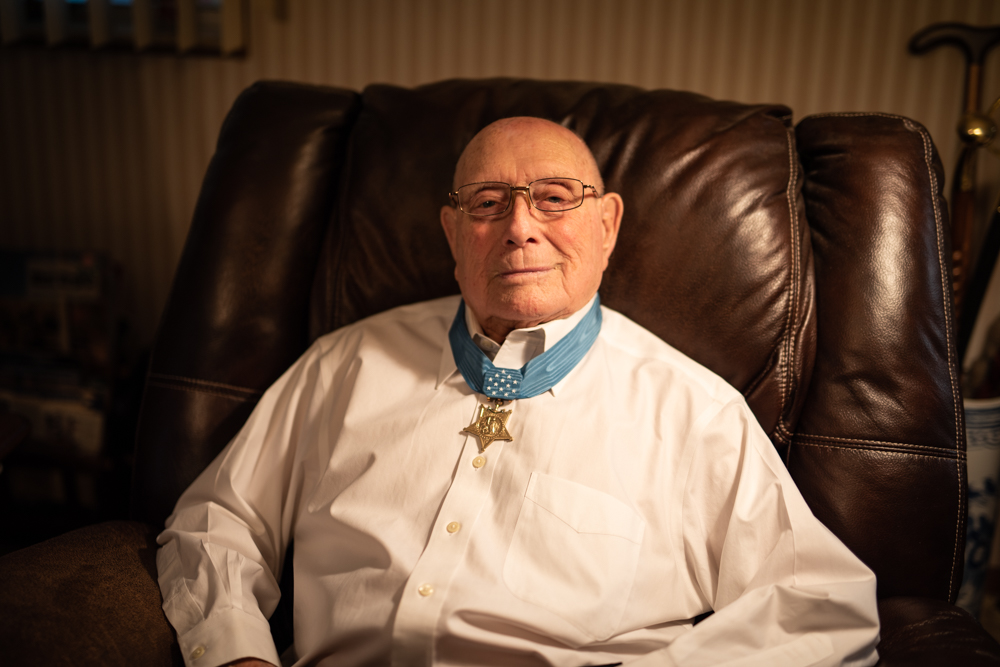“There are some memories that you would just love to eradicate from your mind – and can’t,” Hershel “Woody” Williams told HistoryNet. “And then there are other memories that you wish you could bring back – and you can’t.”
On the morning of February 21, 1945 – two days after the initial attack began – the 21-year-old from West Virginia ran toward the prehistoric landscape of Iwo Jima.
The assault was expected to last only 10 days with 30,000 Marines attacking the Japanese-held island. With poor to no intelligence on what faced them, these men waded into withering fire from a network of caves, tunnels, and concrete pillboxes reinforced with rebar – an intricately designed fortress that created deadly interlocking fields of fire. The Marines called it “the Meat Grinder.” With 21,000 fanatical Japanese soldiers vowing to kill at least 10 Americans before being killed themselves, Marine casualties quickly began to mount. One veteran recalled that they were losing so many men “we couldn’t tell if we were winning or losing.”
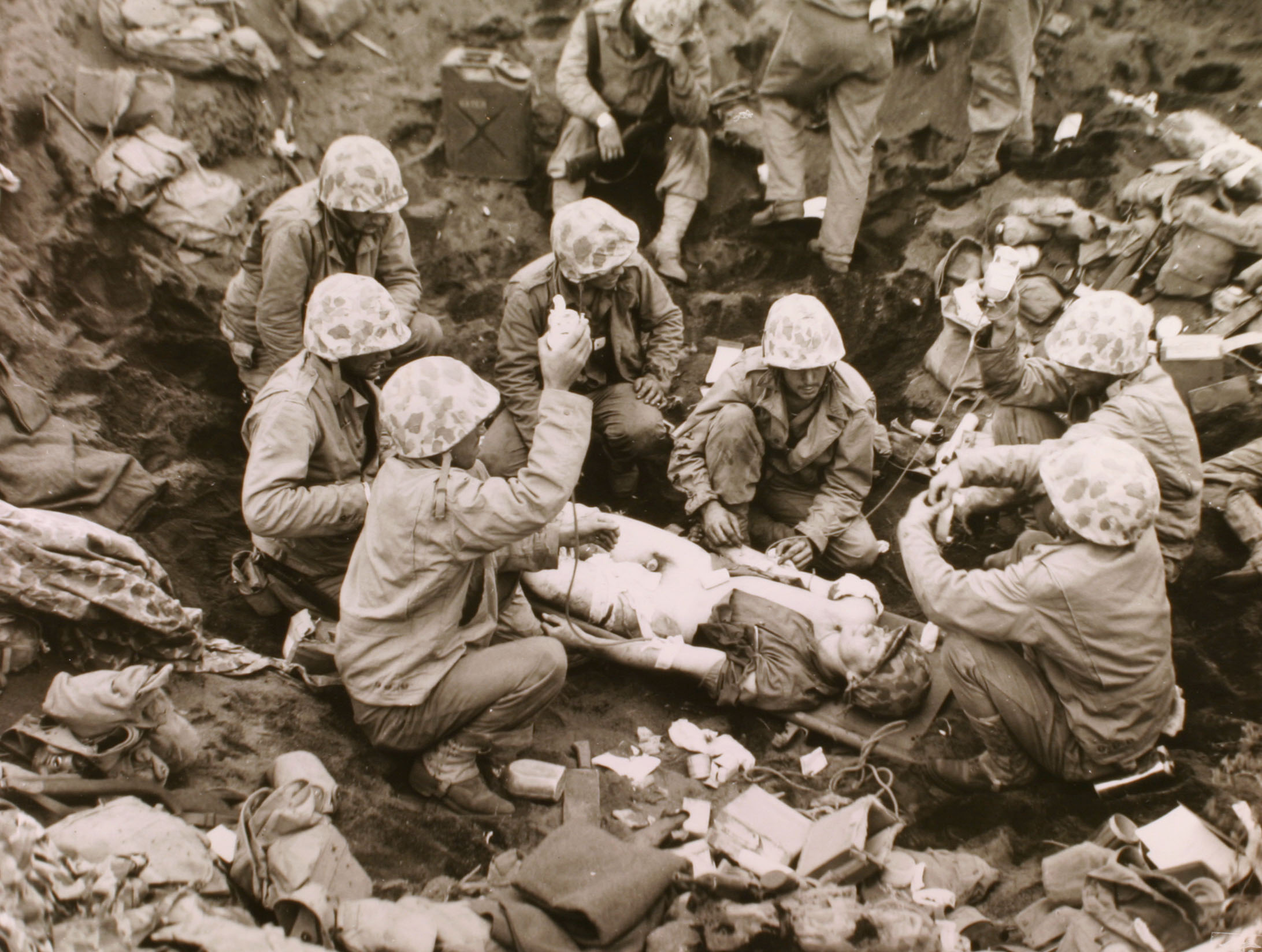
After the first 24 hours, with the situation dire, Admiral Raymond Spruance sent in another wave of 20,000 more men – of the eventual 70,000 – to join the fight. Within that reserve force was Williams.
Running out from a Higgins boat on February 21, Williams recalled the distance from the water to the beach seemed like forever. Entering a maelstrom of snapping bullets, he was shaken by the terrible sight of the bodies of fellow Marines, stacked five, six feet high. “We had no place to put our dead, so the burial people…had rolled them into their ponchos…Just rows of them. That memory will just never, ever go away.”
Through the concussive barrage and confusion of battle, Williams and the six other men from his company in the 3rd Marine Division, ran, crawled, and dug their way toward the entrenched Japanese. The suffocating smell of rotting flesh, mingled with explosives and the volcanic sulfur odor of the island itself, nauseated the Marines.
By the 23rd, a “commanding officer and two other officers were all that was left. Most of the squad leaders were gone,” Williams recalled. “We had one gunnery sergeant still left. People were taking on jobs that they had never even dreamed they would be taking – a squad leader as a PFC. It didn’t matter what your rank was, if you could find somebody to work with you, you worked with them.”
It was on this day that Williams, having been made an acting sergeant, found himself in an NCO meeting – at the base of a bomb crater. The situation was chaotic, but this much was clear: the Marines couldn’t advance until the surrounding pillboxes were taken out.
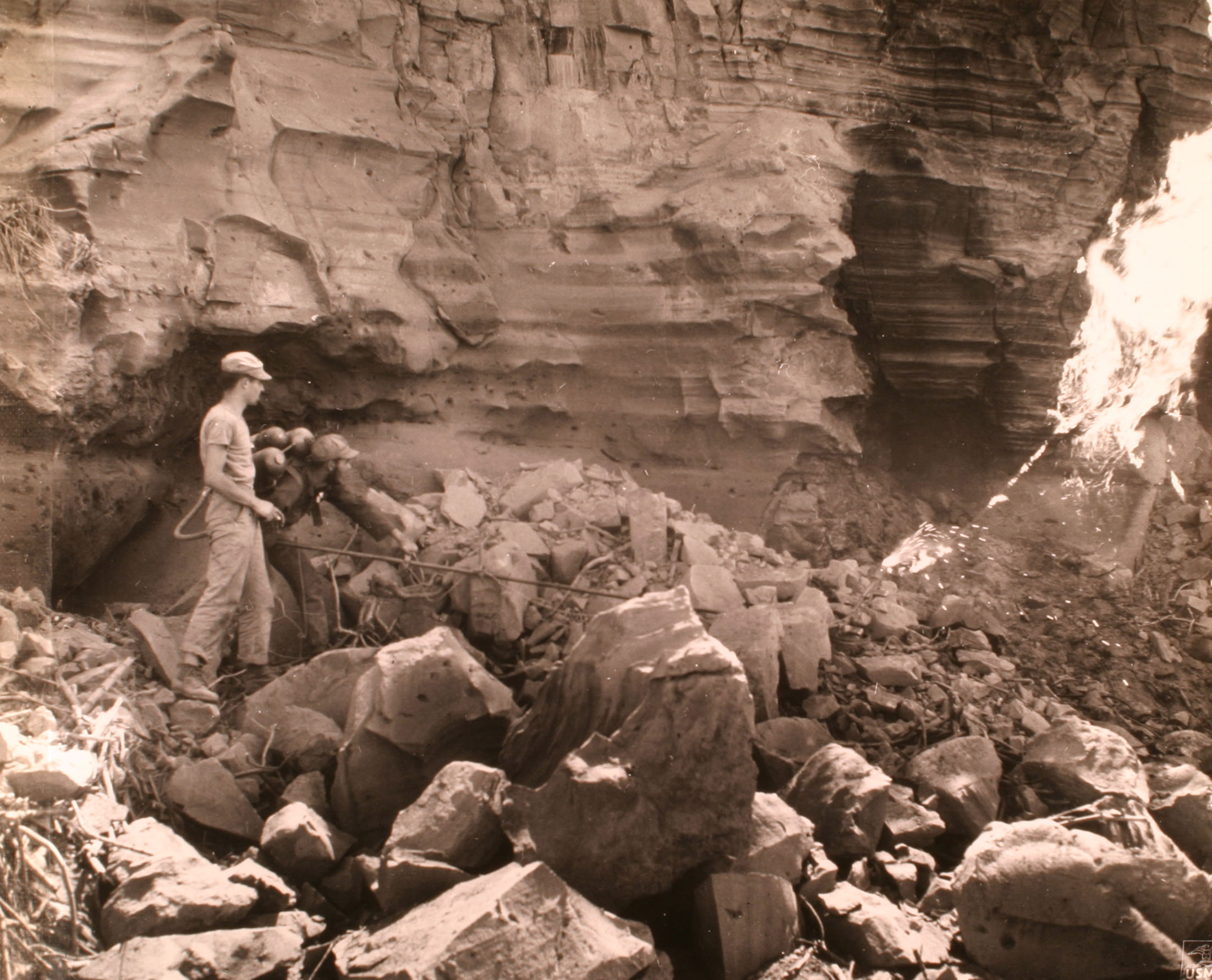
Williams was given a flamethrower and tasked to clear a path for his unit.
He famously replied, “I’ll try.”
“Now if I said that, OK,” Williams said during an interview at his home in Ona, West Virginia. “Kind of sounds like maybe I did, but I don’t remember saying it.”
Joined by two men from his company and two other Marines who had linked up with them in the confusion, the five-foot, six-inch Williams, strapped on 70lbs of “hellacious fury,” and began slowly crawling toward his first target.
Williams’ Medal of Honor citation explains his actions after that:
[Williams] fought desperately for four hours under terrific enemy small-arms fire and repeatedly returned to his own lines to prepare demolition charges and obtain serviced flamethrowers, struggling back, frequently to the rear of hostile emplacements, to wipe out one position after another. On one occasion, he daringly mounted a pillbox to insert the nozzle of his flamethrower through the air vent, killing the occupants and silencing the gun; on another he grimly charged enemy riflemen who attempted to stop him with bayonets and destroyed them with a burst of flame from his weapon. His unyielding determination and extraordinary heroism in the face of ruthless enemy resistance were directly instrumental in neutralizing one of the most fanatically defended Japanese strong points encountered by his regiment and aided vitally in enabling his company to reach its objective.
The two Marines who had linked up for the assault were killed that day. A fact, Williams somberly says changes “the whole significance of what this medal represents. It really does.”

“I had men who gave their lives to protect me,” Williams recounted to author James H. Hallas in Uncommon Valor on Iwo Jima. “When I get to heaven one of my first questions to God will be: ‘Why me?’”
Of the 36-day battle, Williams fought for 34. Although tapped to be evacuated on March 6 after sustaining a shrapnel wound to his leg, Williams chose to remain behind to help teach green Marine replacements proper battle procedure.
By March 26 the island was declared in U.S. hands, but at the deadly cost of nearly 7,000 Marines. War Correspondent Robert Sherrod wrote, General Tadamichi “Kuribayashi never gave the order of the battle-ending banzai attack. His men stayed in their tunnels and their mole hills to the deathly end, and we had to go in and dig them out, or burn [them] out, or seal them in. There was nothing else for us to do.”
Of the 21,000 Japanese under Kuribayashi’s command, only 212 defenders were still alive to surrender – just 1 percent of the original garrison.
After two and a half years of training and fighting in the Pacific, Williams was sent home. Twenty-seven Medals of Honor were awarded for the fighting on Iwo; more than double the 12 earned during Operation Overlord, the battle that began with the invasion of Normandy.
Prior to receiving the award, Williams had never even heard of the MoH and found the award ceremony surreal. “They always read the citation before they present the medal and those words were extremely foreign to me. I didn’t even know why they were reading it. I had done the things they had said I’d done, but it felt so strange to hear them talk about me doing my duty.”
He does remember that his legs didn’t seem to want to cooperate when President Harry Truman approached him. But that nerve-wracking experience was dwarfed by meeting the commandant of the Marine Corps, General Alexander A. Vandegrift.
Vandegrift, a Medal of Honor recipient himself for his actions on Guadalcanal, sternly told Williams “That medal does not belong to you. It belongs to all of those Marines who did not get to come home. And don’t ever do anything that would tarnish that medal.”
Williams has lived by those words.
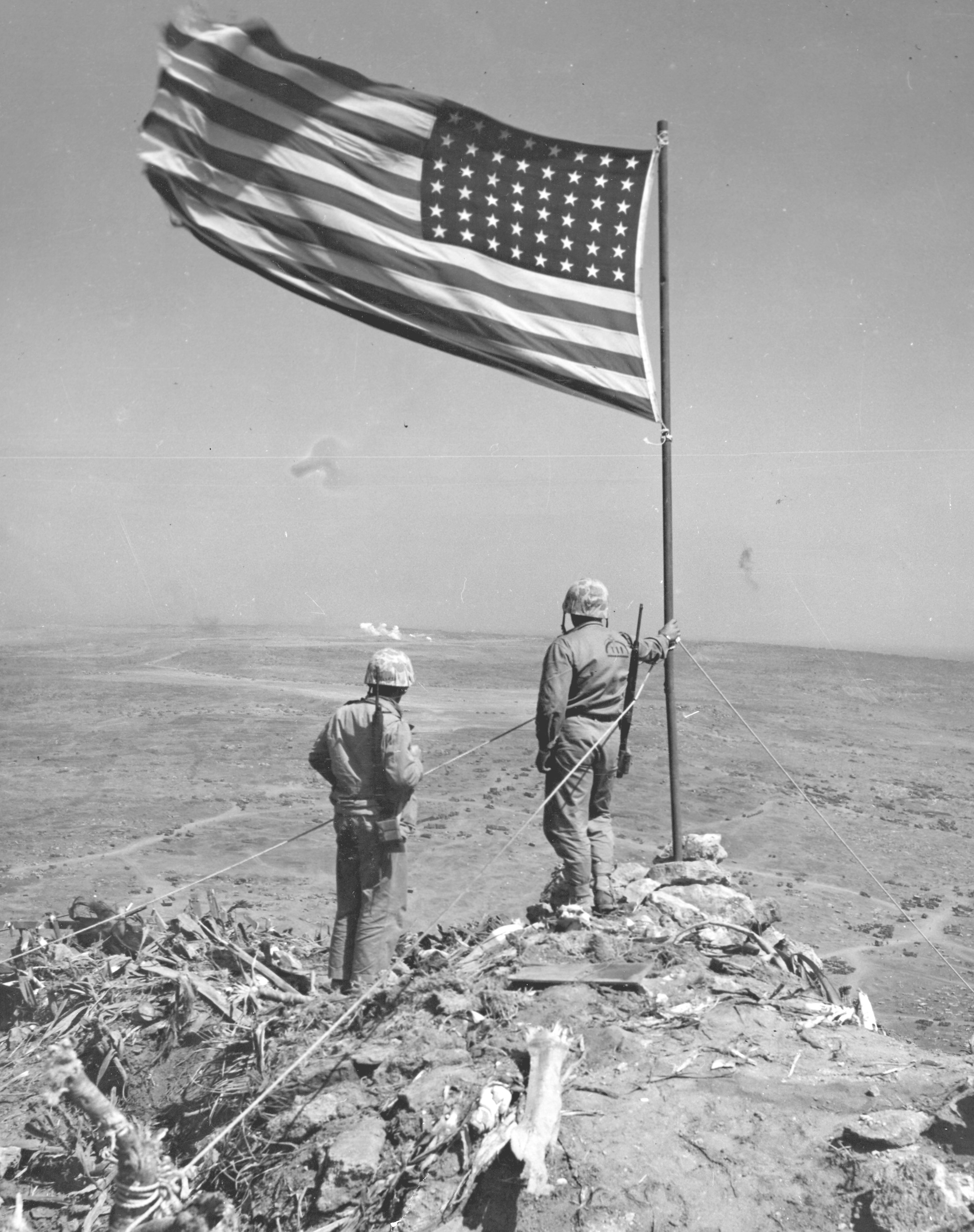
Homecoming
Self-described as shy and timid prior to the war, the Medal of Honor forced Williams “to become public…whether [he] wanted it or not.” And, in a sense, it saved him.
“It was probably one of the best therapies that I could have really had,” Williams said. “I couldn’t withdraw into myself. I couldn’t go off by myself and have these thoughts or flashbacks.”
The transition back home was not without some difficulty, however. In the initial days, Williams would often have nightmares about a conflagration that was seemingly spreading on the walls of his bedroom, seeing bursts of flames, or “crazy, crazy stuff” as he put it.
By being forced to discuss Iwo Jima and its traumas, it enabled him to rationalize and evaluate his service. “Had I gone back to the farm, as a farm boy, without having received the Medal of Honor, I have no idea what would have happened,” he said. But he didn’t have to look far to understand how different his journey might have been. Williams’s brother, William Gerald Williams suffered what the Marines called a crack up. The Army called it combat fatigue. Now it’s understood as post-traumatic stress disorder.
And while both brothers suffered from PTSD, each had vastly different outcomes.
William, serving under Patton’s Third Army, fought in the Ardennes during the bitter Battle of the Bulge. There, he suffered two gunshot wounds –– one through the left shoulder and one through the left rib cage.
William’s poor luck didn’t stop there. While riding in a train taking him away from the front lines, a German pilot managed to strafe said train. After this, William “shook uncontrollably and he could no longer string together a coherent sentence.”
William was placed in a psychiatric hospital in England and wouldn’t return home until December 1945. He was never the same again and died at age 42.
“He just gave up. That’s all there was to it,” Williams said of his brother’s death. “We didn’t have any autopsy or anything like that, but the way the doctor explained it is his heart just quit. He didn’t have a heart attack. We never did understand that.”
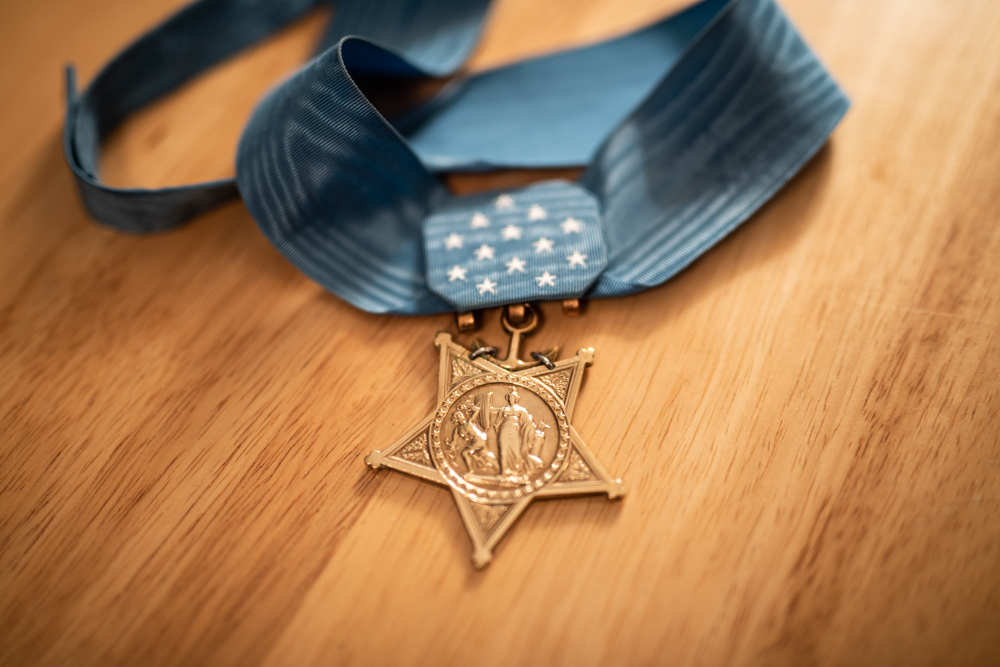
Williams himself found solace through his community, his family, and the church. Non-religious prior to the war; an “accidental Catholic” during the war after mistakenly putting the letter “C” in the religion category of his enlistment papers; after the war Williams found relief from his PTSD through the Methodist Church.
Just 18 days after returning home, Williams would marry his girlfriend, Ruby, on October 17, 1945. Together, he and Ruby would raise two daughters.
Williams accepted a position as a veteran counselor with the Veterans Affairs and worked with men returning home who needed help transitioning. He would remain with the VA for 33 years until his retirement.
At the age of 96, Williams continues to serve his country through The Hershel “Woody” Williams Medal of Honor Foundation, which, according to the mission statement, honors “Gold Star Families, Relatives and Children by building Gold Star Families Memorial Monuments throughout the United States, by offering scholarships to Gold Star Children, by sponsoring outreach programs and events and by educating communities about Gold Star Families and the sacrifice they have endured.”
It is such a fine line that separates what a soldier does under the intense fear that such combat brings. To act without fear can lead to foolish consequences. To be frozen by it is its own form of surrender. “Life is so precious, I believe anybody being shot at has a fear…that the fear is there, but if fear takes over you become useless,” said Williams. “You don’t rationalize in my opinion. You start rationalizing then you start backing up.”
Williams walked that line and got the job done.
And what a job it was.

